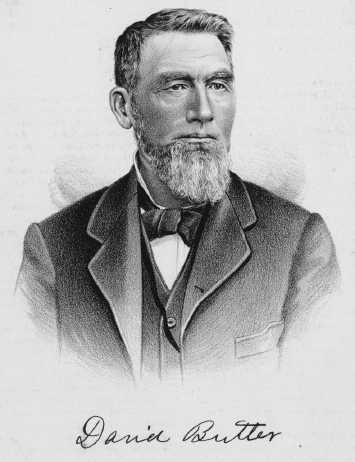112  DAVID
BUTLER.
DAVID
BUTLER.
farm until he was twenty-one years of age, but long
before attaining his majority was a thorough,
practical farmer, and understood all that was
necessary in regard to the management of stock. In his
youth he had given promise of powers and intelligence,
and though they lay dormant for many years, were bound
to make themselves known and felt, as had been the
case of the Virginian pioneer in Ohio, to whom
reference was made above.
Upon reaching man's estate Mr.
Butler launched into the serious business of life upon
his own account by taking as his chosen occupation
that with which he was best acquainted and in which he
felt most assured of success, viz., agriculture and
the breeding of and traffic in stock. The latter
department of his business frequently called him away
from home, and he has traveled far and wide throughout
the Great West while thus engaged. His previous
experience, natural ability, inherent enterprise and
American push made him even more prosperous in his
dealings and various undertakings than his most
sanguine hopes had conceived, but he did not halt with
the first flush of his success, but continued to go on
to even greater.
In 1852 Mr. Butler embarked in
mercantile pursuits but did not sever his connection
from what had become a very extensive trade in cattle
and hogs. Both branches were carried on with a
growing, financial success until the crash of 1857,
when, owing to the failure of the National Bank at
Gosport, Ind., he lost a very Iarge sum, and was
further crippled financially by the failure of a large
number of his creditors to meet their obligations; but
he was determined no one should be the loser upon his
account. He settled up business satisfactorily, paid
dollar for dollar of everything held against him and
interest where it was due.
In the fall of 1859 Mr. Butler
removed to Pawnee City, Neb., and there associated
himself with the Hon. W. B. Raper, and with that
gentleman embarked again in business; but even here he
retained his interest in the cattle trade, and was
very shortly gratified to see his earnest efforts
rewarded and to be able to fill a larger place than
had been possible before his trials in 1857. This
partnership lasted until 1861, when Mr. Butler was
elected a member of the Territorial Legislature, and
was after that nominated for Senator by the
Republicans; but there being three candidates already
in the field our subject withdrew in favor of Mr.
Mack.
In 1863 Mr. Butler was elected State
Senator for a term of two years, representing the
First District, which comprised the counties of
Richardson, Pawnee, Johnson, Gage, Clay, Jefferson and
all the unorganized territory lying to the westward.
Both in the House and Senate Mr. Butler made his mark,
and did good service for his constituents and the
State, and it was as a result of the ability then
manifested and recognized, the personal worth and high
character sustained by him, that he was nominated and
by a large majority vote passed by the hand of the
people to the highest chair of office within the gift
of the people.
Among the services rendered the
State by Mr. Butler while in the Legislature may be
mentioned the introduction of a bill for the
reapportioning of Nebraska, the passage of which he
worked very hard to procure, but in Legislative halls
as in every other the green eyed monster of jealousy
is bound to find admittance. It was so in this case,
and to this was due the failure of our subject in
spite of his hard work; but upon renewing the fight in
the Senate he was successful and the bill went through
intact.
Upon retiring from public life Mr.
Butler returned to his mercantile pursuits with
renewed ardor and prosperity, and he has continued to
live in Pawnee City or its immediate vicinity
since.
Gov. Butler was, in January, 1860,
united in marriage to Miss Lydia Storey, of
Bloomington, Ind., and who is the daughter of Harrison
Storey, Esq. Of this happy union there have been born
four children, to whom were given the names: Violet
E., Seth D., Durias and Paul.
Gov. Butler is a genial, affable
gentleman of large intelligence, high character and
undoubted popularity. Upon the 4th of September, 1888,
he was nominated for Governor on the Union Labor
ticket, and is now stumping the State in behalf of
that movement. In the special order of Odd Fellowship
Gov. Butler is prominent and also very highly
esteemed. He is affiliated with Interior Lodge No. 9,
at Pawnee City.

